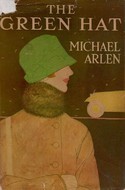I love old books. For one thing, if they have to be retrieved from the remote shelving of the local library and the pages are yellowed, you know they were not created by AI. The old-fashioned writing style can be both challenging and charming. In the case of The Green Hat by Michael Arlen, when the author is determined to make a point or elaborate on a theme, he goes off on verbose tangents. But there are gems hidden in the prose, sometimes insightful and sometimes clever and amusing, that make all the verbosity worthwhile. The many references that I don’t get make me all the more pleased when I do recognize something historical or obscure. And the stories draw me in by virtue of their strangeness.
The Green Hat was a popular novel back in 1924. I had never heard of it or of the author until I saw it referenced in The Prodigal Women by Nancy Hale. Intrigued, I wanted to read it.
The novel starts slow, primarily because of those verbose tangents. The author is making a point about England – the old aristocratic England that was fading away post WWI. It’s a novel ostensibly about a woman, an idealized woman, but actually the focus is more on the men in her sphere. Her name is Iris Storm, maiden name March. The old aristocrats care about her. They adored her as a child. But they are ashamed of the woman she has become. (She sleeps around.) She has been twice widowed. Her first husband, a favored, honorable young man of their circle, committed suicide on their wedding night. Her fault, she admits.
The narrator is another aristocratic young man, a friend of Gerald March, Iris’ alcoholic twin brother. He first meets Iris when she comes to visit her brother after an absence of ten years. The narrator is smitten with her, but in a detached sort of way. He is almost accidentally present at key points in her tale, but remains on the fringes of her drama. From this vantage point, he tells her story as it was revealed to him in little bits over the next couple of years.
The reader is sucked in as the narrator reveals what he learns, little by little. Always, the reader is aware there is more going on than meets the eye. The men are supercilious and a bit ridiculous as they adhere to their old beliefs and ideas of correct conduct. Iris stands outside of their rules. She goes her own way. And that means they have to shun her, even as they keep tabs on her. But she is as trapped by her own moral code as they are by theirs. And I get the sense that this is all an elaborate metaphor for post-war England.
The big reveal at the end is a nice twist, although it’s hardly the moral shocker to twenty-first century readers that it might have been at the time. If you can find a copy of this novel, give it a try. It’s quite fascinating.














No comments:
Post a Comment